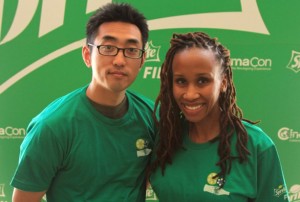
The students are now part of a voting campaign for their 60-second spot titled “No Doubt About It.”
The film, along with three other film finalists, has also been spotlighted in a trailer playing in movie theaters throughout August.
The winning team of the Fan Favorite Award, for which voting ends on Aug. 31, will receive a $5,000 prize donated to its university’s film department. The winner of the Green Ribbon Panel Award will have the chance to work on a $30,000 contract job for Sprite and The Coca-Cola Company. While the Fan Favorite Award is given based on popular vote, the winner of the Green Ribbon Panel Award is selected by a group of film industry experts.
UCLA students have participated in this contest since it first began in 1998 as the Coca-Cola Refreshing Filmmaker’s Award. Previous UCLA participants include 1998 finalist Paul Castro and last year’s Green Ribbon Panel Award winners Steven Huffaker and Simon Savelyev.
Kim said he first became interested in entering the competition after hearing about it through the School of Theater, Film and Television.
The Sprite Films contest has since helped Kim create, direct and film his short. “No Doubt About It” depicts the main character’s development from a young boy sitting in his house and listening to music through headphones to a full-blown DJ playing music for a packed house.
Kim said the one-page script he originally submitted last September consisted of a storyline about a track star, but Sprite Films suggested some changes to his main character. Even with this modification, Kim said he was still able to maintain control over the film’s direction and the final product he and his team created.
“I pretty much had full creative control with what kind of music was used, but there was a lot of guidance,” Kim said. “They loved everything, pretty much. They just wanted the main guy to have a different profession.”
In order to transform this script into the film, Kim enlisted Ambrecht’s assistance in producing his short.
Kim and each of the other finalists were allotted $15,000 with which to make their films a reality, which posed a significant challenge, even for a 60-second spot.
Despite the one-day time constraint under which Kim’s spot was filmed, he said he was still able to try new things during the one-day shoot, such as dolly movement to allow for more camera angles while capturing the film’s action.
Ambrecht also said that while some of the other shorts were filmed on location during their multiple-day shoots, Kim’s film was shot on the UCLA soundstage.
In addition to experimenting with new techniques, Belinda Starkie, a professor in the production/directing area of the School of Theater, Film and Television, said Kim’s film is also impressive because it demonstrates his team’s ability to thrive under the pressure of filming the entire piece in just one day.
Even though the crew was unable to shoot in multiple locations, Starkie said Kim still managed to create the effect of movement from one place to another in the film.
“The project he did was phenomenal. He did it in one day and his crew was amazing,” Starkie said. “I was actually blown away by what they were able to do in one day.”
Kim said this project was different from other film endeavors he has taken on at UCLA because of its more rigid structure and schedule.
“Normally the short films that we make at UCLA don’t really have a timeline that’s that strict,” Kim said. “The timeline was kind of flexible, but … I think working with a fixed budget (was) the real main difference.”
Kim said he hopes that, if he wins, he will have achieved his main goal – to create a product that entertains audiences.
“I hope that people enjoy it,” Kim said. “I don’t really expect anything outside of that at all. I don’t make short films for a specific purpose other than for the audience to enjoy.”
